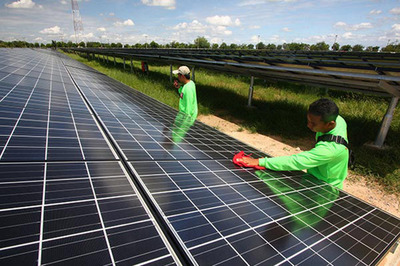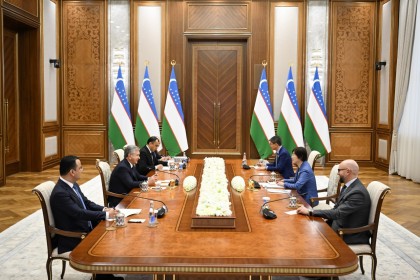The European Bank for Reconstruction and Development (EBRD), which became fully aligned with the Paris Agreement at the start of 2023, continues to invest in renewable energy power generation and low-carbon technologies in Uzbekistan. The Bank is helping the country develop its significant renewable energy potential by financing the construction of three greenfield solar power plants with total installed capacity of nearly 900 MW.
The US$ 205 million financial package, organised by the EBRD, is for the Abu Dhabi Future Energy Company, also known as Masdar, a global renewable and clean energy company and the Bank’s long-term client. It is expected that these projects will be co-financed by the Asian Development Bank (ADB), Asian Infrastructure Investment Bank (AIIB) and the European Investment Bank (EIB).
The package consists of EBRD A/B loans and revolving facilities. The A loans, collectively worth up to US$ 109 million, will be for the Bank’s own account and the B loans of up to US$ 18 million are expected to be financed by the Dutch entrepreneurial development bank FMO. The loans will be complemented by three revolving facilities of up to US$ 78 million provided by the EBRD.
The funds will help construct and put into operation Nur Jizzakh (a 220 MW solar photovoltaic power plant in the Jizzakh region), Nur Samarkand (a 220 MW solar photovoltaic power plant in the Samarkand region) and Nur Sherabad (a 457 MW solar photovoltaic power plant in the Surkhandarya region). Once commissioned, the three projects are expected to generate up to 2,200 GWh of electricity, providing power to over 1 million homes in Uzbekistan, and reducing annual CO2 emissions by up to 1.2 million tonnes.
The projects contribute to a long-term decarbonisation plan that the EBRD and the government of Uzbekistan have jointly developed, which aims to achieve a carbon neutral power sector by 2050.
Uzbekistan’s renewables deployment plan targets the development of 12 GW of solar and wind capacity by 2030. With the EBRD’s support, the country has embarked on major power sector reforms to establish an effective regulatory regime, enhancing the security of power supplies and attracting private investment into the energy sector.












